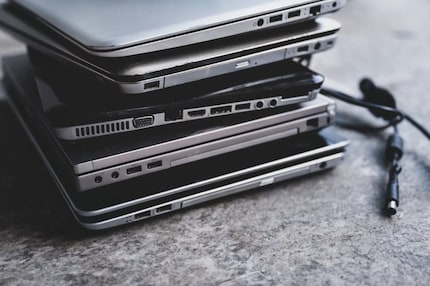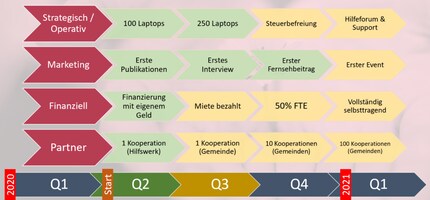
Background information
From nerd to app developer: Kevin Reutter’s story
by Kim Muntinga

Since the start of the coronavirus crisis, 26-year-old Tobias Schär has refurbished over 300 used laptops and given them away to people in need. He explains why he is doing this in an interview.
Young people, what do they have on their minds? Partying, selfies, travelling? Of course they do! What else? Not all of them. After reading the interview with Tobias Schär, you might believe a little more in a bright future. Because the 26-year-old from Merenschwand in the canton of Aargau tackles problems where others just moan or - even worse - don't recognise them at all. These days, Tobias is also packing boxes to move out of his parents' house and into his first flat of his own. He also has a 70 per cent job as a consultant and is studying business informatics. And in between, he drops by Digitec in Zurich and tells me in an interview about his project "Wir lernen weiter" (WLW). The aim of the project is to give used laptops to families with school-age children or to students who are too poor to buy their own hardware.
What was the triggering moment for you to start your aid project?
Tobias: It was a very spontaneous idea. When the measures were imposed in March due to corona and distance learning became important for schools, I thought that perhaps many people don't have access to the digital world because they simply don't have the devices. And the number of enquiries I have now suggests that I wasn't so wrong.
And how did it actually start?
I just got started. There's no romanticised story behind it. It was a spontaneous idea over an online beer with colleagues. I built the website that same evening and a few days later it was live.
How big is your team actually?
Team ... I'm still on my own at the moment (laughs). Alongside my job and studies. But I have no regrets, even if I didn't get such good grades this semester - luckily I didn't quite reach the "four wins" level. But I think I'm doing something ten times more important for my CV with this little side hustle.
How should I visualise the laptop refurbishment process?
I realised right from the start that the processes had to scale - especially as I was working alone. In the beginning, I managed three or four devices per hour, now it's twelve. I have lots of USB sticks with data clean-up tools, operating system images - Zorin OS and Windows 10 - and various utilities. I then put up to 16 laptops on the floor in my room and the first thing I do is a complete data clean-up. Fortunately, I have enough power strips and electricity in the cabin. The clean-up process then runs autonomously for an average of two to three hours, depending on the storage media. Of course, I can also use this time for other purposes. After that, I completely reset the laptops. But I can do that in about five minutes per computer. At the end, I test the microphone, speakers, camera and battery. If something doesn't work, I make a note of it on the accompanying sheet.

And who gets which device?
Of course, laptops come in a wide variety of qualities - I pay attention to the context of those seeking help. For example, learners from the software development sector have different requirements to fulfil than someone in 6th grade, for example. It's important to me that the recipients can get started straight away. And that's why every laptop comes with a four-page instruction manual containing tips and tricks depending on the operating system. Basically, you just have to enter the default password and off you go. LibreOffice, an alternative to Microsoft Office, Skype and Zoom, is installed by default. Of course, the recipients can then install whatever they want on their devices.
I've currently commandeered the top floor of my parents' house for the project. But now I'm moving. I would like to take this opportunity to say a big thank you to them. Because without this space, it would be an organisational and logistical nightmare!
What is the typical laptop that you get donated? Is there any junk in there too?
In the beginning, there were a lot of unusable items, such as computers with too little computing power. Now I evaluate beforehand whether a laptop on sale is still suitable and currently have a recycling rate of around 80 per cent. When I think that the majority of the donated devices would otherwise have ended up as electronic waste, I think that's great. Laptops with two gigabytes of RAM or more are interesting for passing on; this means that I can then install the slim Zorin OS, which is also very similar to Windows 10 in terms of graphics. Experience has shown that Windows 10 works reasonably well from three gigabytes of RAM. However, I don't want to expect anyone to use an even lighter operating system than Zorin. Running several programmes at the same time is no longer so exciting. Of course, the storage medium and the processor also play a role. The sticking point for many devices is definitely the RAM. Ultimately, I can only install Windows 10 on devices that already have a valid Windows 10 licence. Unfortunately, Microsoft turned me down here, as licences are distributed via the partner shops - and if no revenue can be generated there, it's of no interest to them. But perhaps Microsoft will still be able to persuade the media to support this good cause? A volume key with Windows 10 Home would be enough for this.
And how do the laptops get to the recipients?
I've already done about 80 mailings myself - in the beginning even completely free of charge. But of course that wouldn't work out monetarily "on the long run". In the meantime, I've started charging a small fee for postage, cardboard and packaging material. I prefer people to collect the devices themselves - then everything is free and I save myself the effort of packing. Preparing the laptops for dispatch is tedious - you have to keep track of where everything is going. Keyword "Track & Trace". Another advantage of direct delivery is, of course, that I receive unfiltered gratitude from the recipients - and for me, that's the best reward of the whole thing.

But you can't do that permanently, can you?
That's right. I'm currently working on getting the handling to run via communities or aid organisations. The decision as to whether a person receives a device would then be made there. And I would receive a small article for the handling. In this sense, it could be seen as a kind of "public service", for which local authorities could also make a contribution.
You don't earn anything yet?
No - everything is currently done on a voluntary basis. However, if municipalities were to take up this service, a great deal could easily be achieved. Because if you look at the whole thing financially, it could help the welfare state enormously if a digitally well-educated workforce could be created from it. IT skills and equipment also make it easier to integrate into the world of work, for example when looking for a job, which is now mainly done digitally. The high number of requests for laptops shows me that we have a problem with the digitalisation of education, which can later lead to people no longer having a chance in working life. That's why I'm also getting involved politically. That way, I can try to tackle the cause and not just the symptoms. However, it is important that the difference is made clear. There is Tobias Schär as the founder of "Wir lernen weiter", which is politically neutral, and then there is Tobias Schär as a political person. As the founder, I help people in need; as a political figure, I try to achieve long-term solutions. There are many people who are a little politically active in their spare time. I don't see a problem with that - because the project is for a good cause that will hopefully be recognised as meaningful for everyone.
How do you actually manage to juggle everything?I know exactly which hours of the day I use efficiently and which I don't. When I'm gaming, I do it in a dedicated way. The same goes for working, studying and spending time with my girlfriend: focussing on what you're doing. Many people don't manage to do this nowadays because it's easy to be tempted to follow the notifications on your mobile, for example - and this change of context isn't productive. Because I prevent this, I have more time; and that's why people think I do so much. But maybe I just organise myself a little better and am disciplined about it. I actually plan everything in advance and try not to focus on flexibility when organising my time, as I do in other areas. It works perfectly for me. I'm agile where it counts. For example, with my project.
And what drives you?
For many, ongoing digitalisation doesn't mean added value, but isolation. The bad thing is that nobody helps. Anyone who can't operate a PC from a basic level already has a smaller selection of possible jobs in the world of work. I am of the opinion that there will be fewer and fewer such jobs in the future. Many people already work with computerised systems in the skilled trades - but many people don't realise it. We need to start with basic training so that people enjoy working with them from the outset - and this is where your own equipment plays a major role. Access to our own digital resources should be a basic right in our country. We could always implement this.
Not everyone has access?
Unfortunately not. In the canton of Aargau alone, I estimate that around 30,000 devices are needed to cover all households - and that's a defensive figure. I arrive at this figure based on the poverty rate and the size of the population - and then some insider information from the project. But the exact shortfall has never been calculated, and that's part of the problem. The schools, municipalities or cantonal authorities are not concerned with finding a centralised solution - at least as far as I can see in the canton of Aargau. There, I suggested to the Department of Education, Culture & Sport that I could carry out a corresponding study. This was then rejected on the grounds that IT equipment was not a priority problem in the canton. They wanted to focus on the development of didactic concepts. How realistic this judgement is, however, I leave to everyone to decide for themselves. I will now write the same bachelor's thesis for the Lucerne University of Applied Sciences and Arts. Because now I know all the more that no clean and objective analysis will be made on the cantonal side. Of course, federalism "ad extremis" also means that all decision-making power and responsibility lies with the municipalities; and I'm pretty sure that in many places they lack the expertise to create future-proof IT concepts - especially with a focus on equipping families affected by poverty.
In conversation, it becomes clear that basic digital education is a matter close to Tobias' heart. He talks about a community where pupils without their own computers can borrow iPads at home. But Tobias believes it would be better if every pupil had their own laptop to experiment and try things out - because as far as he knows, school devices are often only usable to a limited extent and have a very clearly defined setup. He himself became interested in the topic of computers at an early age. As a ten-year-old, he cracked the parental controls that his parents had set up for him on the family computer - by installing a keylogger.
How should your project develop further? You can't go on like this forever.
I've made a plan until mid-2021, but I can already throw that overboard again. With the media attention, it's all developing very quickly at the moment. My vision would be for the project to be self-sustaining and for someone to receive a salary for this work. If I could work 100 per cent for this project, 500 laptops per month would be possible - provided I can find that many devices. And then there would also be more time for important strategic topics, such as working with communities and aid organisations. It should be possible to finance a position. Ultimately, it would be a small investment that could save millions in the social sector in the long term. What is certain, however, is that I will soon receive further voluntary support. This is also urgently needed, for example in marketing, setting up the devices and finding a strategic path.

And do you also have a personal goal for yourself? What comes after your studies?
I don't know yet. I definitely want to do something that I can get behind one hundred per cent. This project would achieve something meaningful on a social, ecological and educational level. But I would also have to be remunerated. I don't think it makes sense for me to provide a free service for the cantons and the state - because there would actually be enough tax money available - and as far as I know, taxpayers are also interested in how tax rates develop. What is certain is that I will remain inquisitive.
What advice would you give to other young people?
Maybe that we should also be a bit demanding for other, older people. We're good at that (laughs). And do something! With my project, I can show that it's possible. I started it from nothing. The only thing I've invested is time. And the only opportunity cost is perhaps missing an episode of Netflix. However, I am clearly an opponent of young people who think that the generation change comes automatically with disparaging slogans on social media; and that this is therefore almost a birthright.
Are there many of them?
Yes, there are unfortunately enough of this clientele, who to be honest are extremely annoying to me, because it's mostly just unfounded talk framed by hip events. In my opinion, you have to earn respect - not with likes and engagement on posts, but with actions that are objectively meaningful. The most important thing is still "doing". And I hope that my project can also show that it actually only takes courage and a certain amount of self-reflection to create something meaningful.
Interviewing Tobias is a rewarding task. I was answered by a very reflective young man with clear ideas and values. Someone who has thought about what articles he can and wants to contribute to improving the world. Someone who is aware of the privilege of living in prosperous Switzerland. And someone who does not turn a blind eye to the injustices and inequality that exist despite our prosperity. He says he has put 450 hours into his WLW project so far. Significantly more than, for example, his profiles on social networks. There he criticises superficiality and finds little substance in much of it.
Is it a problem that some people don't realise what it does when you help others?
Yes, probably too. Knowing that you're opening up someone's prospects with a laptop is motivating. I recently gave some laptops to a school in Bassersdorf. And as a thank you, I received a whole box of handicrafts and letters from the class, even my own certificate for exceptional help during the crisis. And there's often cake and chocolate too, which is dangerous for my satchel in the medium to long term (laughs).
But you can't live on that in the long term.
Of course - you can't buy anything with thanks. But because of the project, companies are already asking me if I want to work for them later on. However, I am very happy with my current employer and receive a lot of support and flexibility; something that is a sign of trust for me and cannot be taken for granted. So there's not a single argument to change the current situation. At least from my point of view. In this respect, however, I also hope that my commitment will one day grow into something bigger. By drawing attention to these shortcomings, I also create transparency for the opportunity costs that arise. And if these are recognised by the right people, I will also receive the necessary support. Because I also firmly believe that karma is not a bitch.
.
Journalist since 1997. Stopovers in Franconia (or the Franken region), Lake Constance, Obwalden, Nidwalden and Zurich. Father since 2014. Expert in editorial organisation and motivation. Focus on sustainability, home office tools, beautiful things for the home, creative toys and sports equipment.
Interesting facts about products, behind-the-scenes looks at manufacturers and deep-dives on interesting people.
Show all